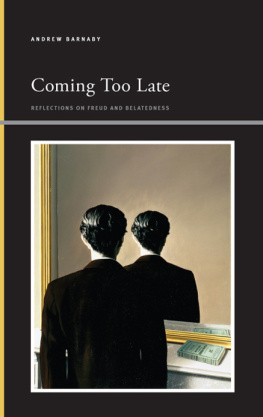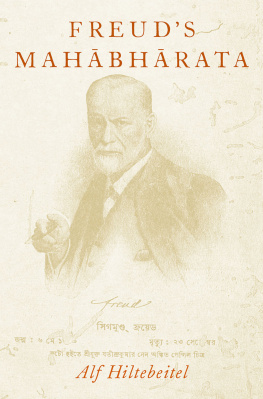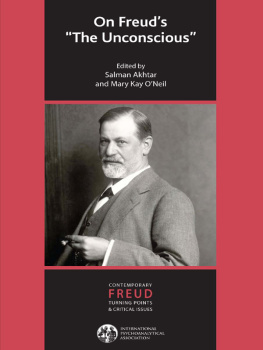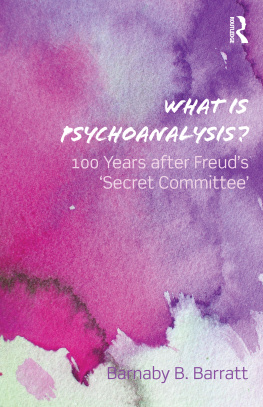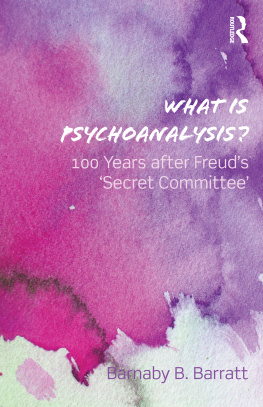Coming Too Late
SUNY series, Insinuations: Philosophy, Psychoanalysis, Literature
Charles Shepherdson, editor
Coming Too Late
REFLECTIONS ON FREUD AND BELATEDNESS
ANDREW BARNABY
Ren Magritte, La Reproduction interdite (Reproduction Forbidden)
Cover art: 2017 C. Herscovici / Artists Rights Society (ARS), New York.
Published by State University of New York Press, Albany
2017 State University of New York
All rights reserved
Printed in the United States of America
No part of this book may be used or reproduced in any manner whatsoever without written permission. No part of this book may be stored in a retrieval system or transmitted in any form or by any means including electronic, electrostatic, magnetic tape, mechanical, photocopying, recording, or otherwise without the prior permission in writing of the publisher.
For information, contact State University of New York Press, Albany, NY
www.sunypress.edu
Production, Diane Ganeles
Marketing, Michael Campochiaro
Library of Congress Cataloging-in-Publication Data
Name: Barnaby, Andrew Thomas, author.
Title: Coming too late : reflections on Freud and belatedness / Andrew Barnaby.
Description: Albany, NY : State University of New York Press, [2017] | Series: SUNY series, Insinuations: Philosophy, psychoanalysis, literature | Includes bibliographical references and index.
Identifiers: LCCN 2016034117 | ISBN 9781438465777 (hardcover : alk. paper)
Subjects: LCSH: Parent and child. | ChildbirthPsychological aspects. | Pre-existence. | Oedipus complex. | Freud, Sigmund, 18561939.
Classification: LCC BF723.P25 B295 2017 | DDC 150.19/52dc23
LC record available at https://lccn.loc.gov/2016034117
10 9 8 7 6 5 4 3 2 1
For Emma and Ian,
and in loving memory of Claire (19961998)
Contents
P ART I
T HE R EFUSAL OF B EING B ORN : P SYCHOANALYSIS , B ELATEDNESS, AND E XISTENTIAL T RAUMA
Introduction to Part I
Why Are We Born? Inversion in Freuds Theme of the Three Caskets
Chapter 1
Awakening is itself the site of a trauma: Rethinking Caruth on Freud
Chapter 2
Owing Life: The Birth Trauma and its Discontents (Rank and Freud)
P ART II
T ARDY S ONS : S HAKESPEARE , F REUD, AND F ILIAL A MBIVALENCE
Chapter 3
More than his fathers death: Mourning at Elsinore and Vienna
Chapter 4
The Afterwards of the Uncanny
P ART III
I S NOT H E YOUR F ATHER WHO C REATED YOU? : B ELATEDNESS AND THE J UDEO -C HRISTIAN T RADITION
Introduction to Part III
Gazing on God
Chapter 5
Satans Gnostic Fantasy
Chapter 6
Choosing the Father in Moses and Monotheism
Note on Citations for Major Primary Works
*For full bibliographical entries, see Works Cited.
1. Freud
a) Most of the citations of Freuds writings will be from The Standard Edition of the Complete Psychological Works of Sigmund Freud, ed. and trans. James Strachey et al., 24 vols. London, 195374. Citations will be given by volume and page number(s) with work identified as necessary.
b) Citations of some of Freuds earliest writings, including letters, will be from The Origins of Psycho-Analysis: Letters to Wilhelm Fliess, Drafts and Notes, 18871902, ed. Marie Bonaparte, et al.; trans. Eric Mosbacher and James Strachey, New York, 1954. Citations will be given by page number(s) following Origins.
c) Citations of Freuds Theme of the Three Caskets will be from C. J. M. Hubbacks translation in The Collected Papers, ed. Joan Riviere, 5 vols. New York, 1959, IV, 24456. Citations will be given by page number(s).
d) Citations of select letters will be from Letters of Sigmund Freud, ed. Ernst L. Freud; trans. Tania and James Stern, New York, 1960. Citations will be given by page number(s) following Letters.
e) Citations of Freuds Moses and Monotheism will be from Katherine Joness translation, New York, 1954. Citations will be given by page number(s).
f) Citations from the original German texts, identified as necessary, will be from Gesammelte Werke, 18 vol., ed. Marie Bonaparte, et al., Frankfurt am Main, 196878. Citations will be given by volume and page number(s).
2. Bible
a) Unless otherwise noted, citations of the Hebrew Bible, by chapter and verse number(s), will be from Tanakh: A New Translation of the Holy Scriptures According to the Traditional Hebrew Text, New York, 1985.
b) Unless otherwise noted, citations of the New Testament, by chapter and verse number(s), will follow the NRSV.
3. Shakespeare
Unless otherwise noted, all citations from Shakespeares plays, by act, scene, and line number(s), will be from The Riverside Shakespeare, 2nd ed., ed. G. Blakemore Evans, et al., Boston, 1996.
4. Milton
a) Citations of Miltons Paradise Lost will be from The Riverside Milton, ed. Roy Flannagan, Boston, 1998. Citations will be given by book and line number(s).
b) Citations of Miltons prose writings will be from The Complete Prose Works, ed. Don M. Wolfe et al., 8 vols. New Haven, 195382. Citations will be given by volume and page number(s).
5. Hoffmann
a) Citations of E. T. A. Hoffmanns The Sandman will be from The Golden Pot and Other Tales, trans. Ritchie Robertson, Oxford, 1992. Citations will be given by page number(s).
b) Citations of Hoffmanns original German text of Der Sandmann will be from Poetische Werke, 12 vols., ed. Walter Wallerstein, Berlin, 1957, III, 344. Citations will be given by page number(s).
Acknowledgments
Part of the argument of this book is that Freud understood the process of looking back as the recognition of a debt incurred. But while Freud saw such a debt as a burden and its recognition as potentially traumatic, the recognition of a debt can also be the cause for the expression of gratitude. And so, as I look back to the various debts I have incurred over the many years in which this book has taken shape, I would like now to express my gratitude to those who have offered special guidance: Lisa Schnell, Todd McGowan, Steve Schillinger, Molly Rothenberg, Loka Losambe, Tony Bradley, and Gabriel Moyal. I would also like to thank the University of Vermonts College of Arts and Sciences and its Department of English for other forms of support. And I would like finally to thank Andrew Kenyon and Charles Shepherdson at SUNY Press for their efficiency and helpfulness in guiding the manuscript through the various stages of the publication process. I dedicate the book to my children who are now and have always been the source of joy and wonder.
Introduction
It is very unhappy, but too late to be helped, the discovery we have made that we exist. That discovery is called the Fall of Man.
Ralph Waldo Emerson, Experience
What stakes are raised by these questions? One doesnt need to be an expert to foresee that they involve thinking about what is meant by living, speaking, dying, being and world as in being-in-the-world or being towards the world, or being-with, being-before, being-behind, being-after, being and following, being followed or being following, there where I am It is too late to deny it. I must once more return to the malaise of this scene. I will do all I can do to prevent its being presented as a primal scene. [W]e shall have to ask ourselves, inevitably, what happens when a son is

